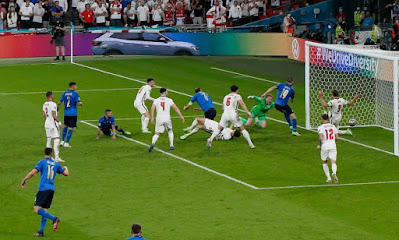Next to a match lost, to misquote the Duke of Wellington, there’s nothing sadder than a match won. But England didn’t even win. How sad is that?
Wellington was talking about battles. Football, on the other hand, is just a game. Win, lose, who cares?
Well, a lot of people seem to care. A lot. So let’s just say, for the sake of argument, that England’s disappointment in the final of the 2020 European football cup wasn’t just a game lost to Italy, but a national disaster. Shouldn’t Englishmen be able to rise above all that? After all, many of my compatriots like to think of themselves as the embodiment of Rudyard Kipling’s hymn to manhood, If. The poem tells us that you’ll be a man:
If you can meet with Triumph and Disaster
And treat those two impostors just the same
If we’re true to ourselves, we English should simply take this result in our stride, congratulate the Italians and move on. That, of course, rather leaves one question hanging: how true are we English to ourselves?
That’s the very thing that made me sad about the game. I didn’t watch it, as I don’t like football and hate the tension of this kind of match. Would I choose root canal treatment in preference? Probably not, but it’d be a close-run thing.
In the dying minutes of the game, I was out with the dogs for their final walk of the day, a pleasure in the tee-shirt temperatures we’re currently enjoying in my adopted home country of Spain. I knew the match had gone into extra time, with the sides tied at one-all.
Suddenly, a groan went up from the house I was passing, which I knew was inhabited by an English family. Simultaneously, from several houses around, came the sound of cheering and whistling.
“Ah,” I thought, “sounds like England’s been beaten on penalties.”
It was the overwhelming pleasure at the result that seemed sad. There was such backing for Italy. Or rather, such ill-will towards England.
That wasn’t limited to Spain, but felt across most of continental Europe.
That reminded me of another match I hadn’t watched, but had admired for the intensity of the fans’ emotion. Fifty-five years earlier, the only other time England had appeared in the final of a major international tournament. That was the 1966 World Cup final.
I was thirteen and living in Italy. I came across Italian neighbours glued to their radios and the commentary on the match. Things could hardly have been more different from last Sunday.
“What’s happening?” I asked one of the neighbours.
“England’s winning, but West Germany is fighting back hard,” he told me.
It was clear that it was the fightback that was making them anxious. To a man, they were backing England.
 |
| 1966: England wins the World Cup With widespread support across Europe, in particular in Italy |
The memories were very much alive, since a young man at the end of the war would be in middle age at the time of that final.
There was a huge reservoir of goodwill towards Britain. It was by no means only in Italy that neutral fans were backing England. I think most of Europe was pleased to see Germany defeated.
It’s the evaporation of that goodwill that’s sad. And it’s a self-inflicted wound. Worse, and far more serious, than a missed penalty.
Brexit is seen by many on the Continent as a kick in the teeth. A contemptuous, disloyal, arrogant turning of the back on other Europeans by a nation that once showed such courage in defending our common destiny. A display of arrogance and condescension as bad as Hitler’s Germany showed to Mussolini’s Italy.
It’s also perceived as a deluded action that is bound to backfire, a betrayal of something in Britain itself, with its long reputation for pragmatic good sense.
Britain is viewed with sorrow. Both for its perceived betrayal. And for its apparent loss of capacity for sound judgement.
That all came out on Sunday night. The match was between good Europeans and lousy ones. Inevitably, other Europeans backed the good ones.
I don’t know whether that loss of goodwill is likely to do any concrete, tangible harm to Britain in the future. Maybe, as the Brexiters claim, Britain can live perfectly well isolated from Europe. Even perhaps as the object of its pity and dislike.
Still, I can’t help feeling that goodwill is something to treasure if you can. I can’t see how life will be easier without it. We may regret having lost it.
In the meantime, I’m struck by the irony that it was Italians who displayed such enthusiasm for England back then in 1966, and Italians who denied England victory on Sunday.
How the wheel of fortune turns…
 |
| 2021: England denied in the Euros By Italy, and to widespread joy across Europe |
No comments:
Post a Comment